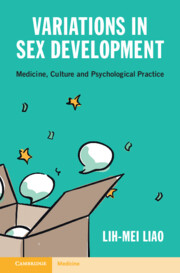Book contents
- Variations in Sex Development
- Reviews
- Variations in Sex Development
- Copyright page
- Dedication
- Contents
- Preface
- Abbreviations
- Section 1 Ordinary Lives
- Section 2 Medicalization and Resistance
- Section 3 Psychological Theories and Applications
- Chapter 7 Psychological Practice
- Chapter 8 Psychological Practice
- Section 4 Working Psychologically
- References
- Index
- Plate Section (PDF Only)
Chapter 7 - Psychological Practice
Epistemic Considerations
from Section 3 - Psychological Theories and Applications
Published online by Cambridge University Press: 18 November 2022
- Variations in Sex Development
- Reviews
- Variations in Sex Development
- Copyright page
- Dedication
- Contents
- Preface
- Abbreviations
- Section 1 Ordinary Lives
- Section 2 Medicalization and Resistance
- Section 3 Psychological Theories and Applications
- Chapter 7 Psychological Practice
- Chapter 8 Psychological Practice
- Section 4 Working Psychologically
- References
- Index
- Plate Section (PDF Only)
Summary
Psychological care is endorsed in DSD medicine. Psychosocial research has been on the increase. But these positive moves have not given psychological practice the kind of collective focus that is enjoyed by the biomedical disciplines. However, psychological care providers have a wide variety of thinking tools and practice techniques to draw on, if to work in an ad hoc way at times. These tools and techniques do not change, but some are more useful and relevant than others for this service context. In Chapter 7, the author discusses the strengths and weaknesses of key theoretical frameworks in healthcare psychology. A major weakness of the individualistic models is their lack of capacity to address structural inequalities in psychological wellness and distress. The author introduces aspects of the Power Threat Meaning Framework and describes how to draw from its theoretical richness to think systemically about what sex variations pose to individuals and families in the social context and how they are responded to. The Framework provides the theoretical backbone for some of the practice vignettes in the final section of the book (Chapters 9–14).
Keywords
- Type
- Chapter
- Information
- Variations in Sex DevelopmentMedicine, Culture and Psychological Practice, pp. 101 - 117Publisher: Cambridge University PressPrint publication year: 2022



